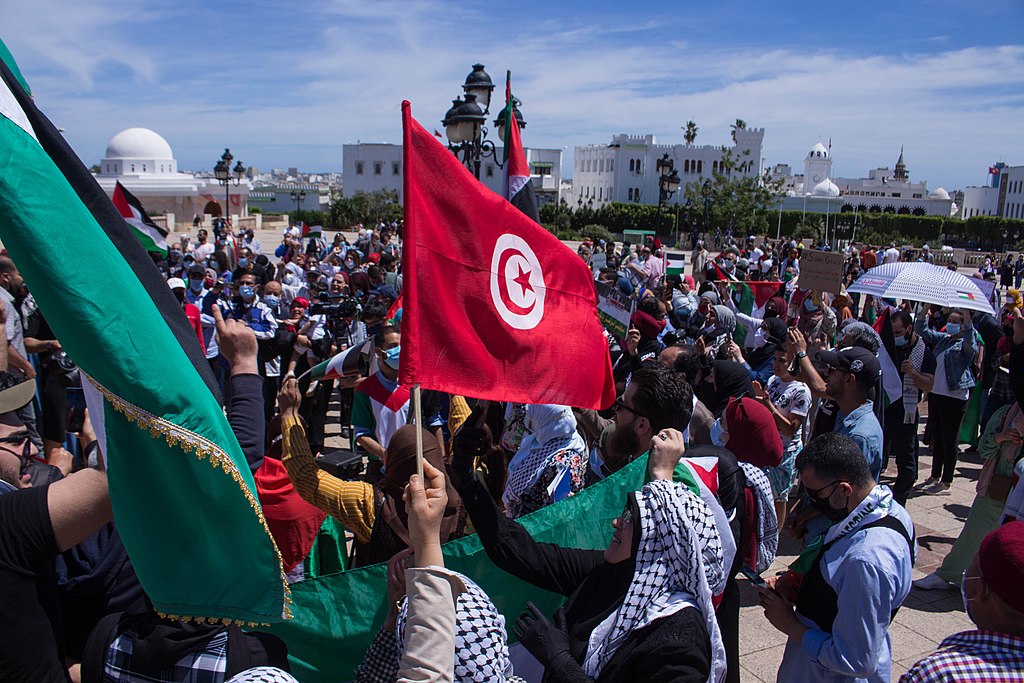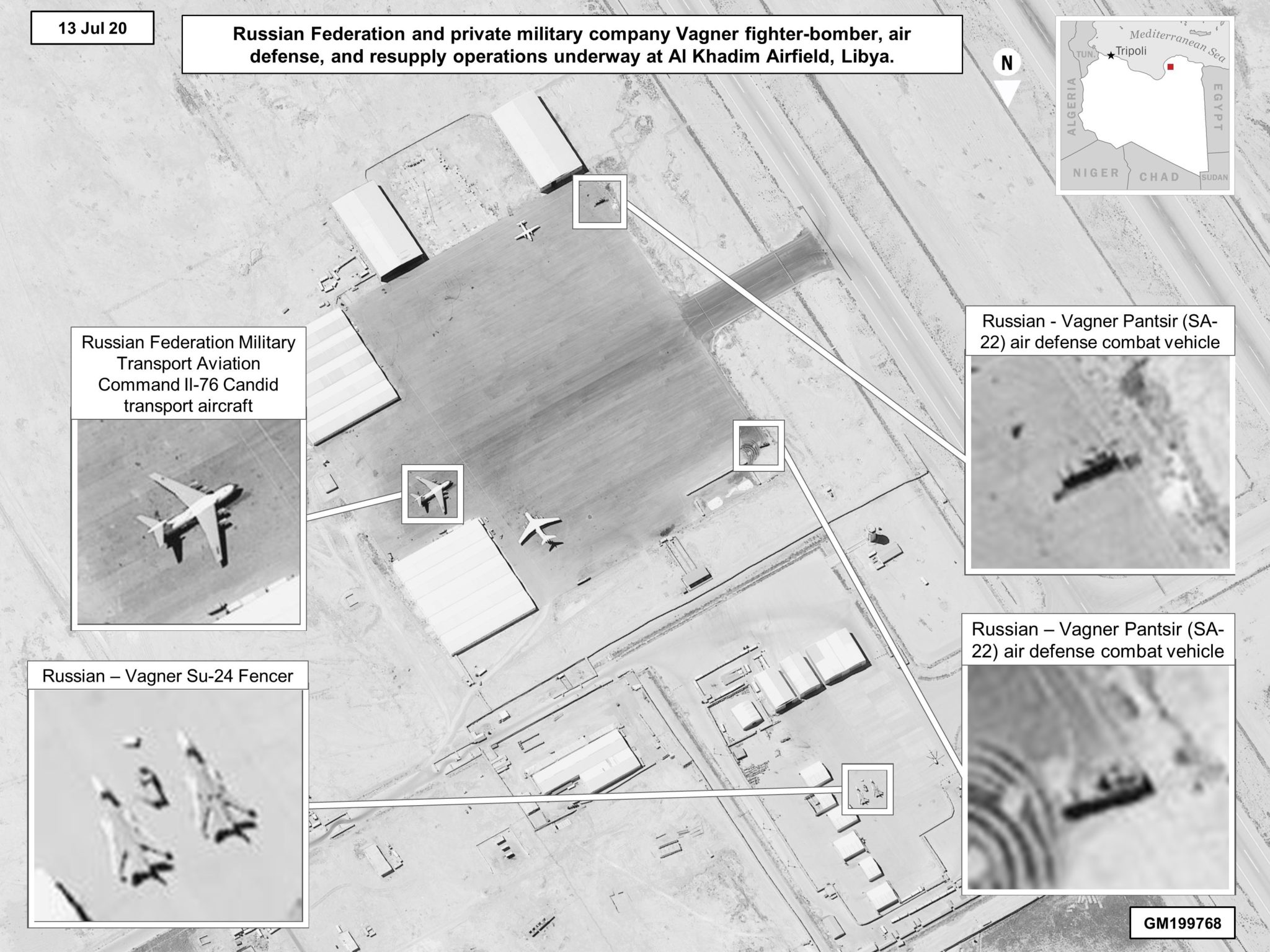
Tunisians protest in support of Palestine in 2021. Since the Hamas attack on Israel in October, North African civil societies have shown a wave of support for Palestine.
“President Tebboune [of Algeria] reiterated to the Palestinian President, ‘the unwavering solidarity of Algeria, both people and government, with the brotherly Palestinian people.’”
Civil societies across North Africa have shown staunch solidarity with the Palestinian cause in response to Israeli retaliation for the 7 October attack by Hamas. The first article from the pan-African news aggregator AfricaNews.fr, provides a broad overview of the pro-Palestinian reactions emanating from Morocco, Libya, and Algeria. Namely, it underscores how civil societies have demonstrated in support of Palestine, and in the case of Morocco,[i] and to a lesser extent, Libya,[ii] have used the conflict to call for the cessation of their states’ efforts to normalize relations with Israel. The protests also denounce the role of the United States and France in the conflict. As per the second article, also from AfricaNews.fr, Tunisians gathered to show support for Palestinians, similarly seeking to penalize their own state for its efforts for rapprochement with Israel. The third article from the Algerian government-owned Algeria Press Service emphasizes the unanimity between Algeria’s government and its citizens on the issue. While protestors in Morocco, Libya, and Tunisia sought to punish their leaders for would-be softening stances towards Israel, in Algeria, President Tebboune faced no such backlash. In a call with Mahmoud Abas, the President of the State of Palestine, he underscored, “the unwavering solidarity of Algeria, both people and government, with the brotherly Palestinian people.”
Sources:
“Manifestations pro-palestiniennes dans plusieurs pays arabes (Pro-Palestinian protests in several Arab countries),” AfricaNews.fr (pan-African news aggregator), 14 October 2023. https://fr.africanews.com/2023/10/14/manifestations-pro-palestiniennes-dans-plusieurs-pays-arabes/
Pro-Palestinian rallies, both organized and spontaneous, in response to the conflict between Israel and Gaza-based militant groups have taken the MENA region by storm. In North Africa, demonstrators gathered in Algeria, Libya, and Morocco to show support in favour of Palestine.
“The entire Algerian people are in solidarity with the Palestinian people and stand by their side. The Palestinian people are in distress and need the support of the Arab and Muslim communities,” shared Khaled Sofiane, pro-Palestinian protester in Algeria.
Despite, Morocco’s normalized ties with Israel in exchange for U.S. recognition of its sovereignty over the long-disputed Western Sahara territory, Prince Moulay Hicham El Alaoui, cousin to the Moroccan monarch, has voiced his support for Palestine on social media.
Thousands of Moroccans also protested to ask the government puts an end to the normalization.
“This is a call to the Moroccan state to stop normalization. An appeal to Morocco, which chairs the Jerusalem Committee, to act urgently, to close the liaison office with Israel. And to withdraw from all agreements. This is what Moroccan people demand today,” expressed Rachid Fellouli, pro-Palestinian protester in Morocco.
In Libya, the 5 El- Emad towers illuminated in the colors of the Palestinian flag in support.
The Libyan government has always publicly sided with Palestine and has not recognized Israel. A couple of months ago, Libya’s head of diplomacy was suspended for meeting with her Israeli counterpart. The news of the encounter had created unrest in the already unstable country.
“Guerre Israël-Hamas: des Tunisiens manifestent pour les Palestiniens (Israel-Hamas War: Tunisians protest for Palestinians),” AfricaNews.fr (pan-African news aggregator), 13 October 2023. https://fr.africanews.com/2023/10/13/guerre-israel-hamas-des-tunisiens-manifestent-pour-les-palestiniens/
Thousands of trade unionists, civil society representatives, political activists, lawyers and high school students demonstrated in the centre of Tunis on Thursday in support of the Palestinian people and called for the criminalisation of any normalisation of relations with Israel.
Denouncing the Israeli strikes against the Gaza Strip, the demonstrators, brandishing the Palestinian flag, gathered in front of the headquarters of the trade union centre, the UGTT, before marching to Avenue Habib Bourguiba, the main thoroughfare in the city centre, AFP journalists observed.
“The people want to penalise normalisation” with Israel, chanted the demonstrators, angry at “Zionist crimes” and “international silence on the genocide in Gaza”, the Palestinian enclave.
The demonstrators also denounced the support of France and the United States for Israel, which had become “allies in the attack on the Palestinians”.
“Algeria: President Tebboune Receives Phone Call From President of State of Palestine,” Algeria Press Service (government-owned news service from Algeria), 9 October 2023. https://allafrica.com/stories/202310090525.html
President of the Republic, Abdelmadjid Tebboune, has received a phone call from his brother the President of the occupied State of Palestine, Mahmoud Abbas, the presidency of the Republic said on Monday.
Abbas informed the president of the Republic “about the grave abuses committed by the occupying forces against the Palestinian people in the Gaza Strip and the West Bank,” the statement said.
President Tebboune reiterated, to the Palestinian President, “the unwavering solidarity of Algeria, both people and government, with the brotherly Palestinian people.”He stressed that “these developments remind everyone that a just and comprehensive peace, as a strategic choice, can only be achieved by establishing an independent, sovereign Palestinian State.”
Notes:
[i] For more on the Israel-Morocco normalization pact of 2020, see: “Israel, Morocco agree to normalise relations in US-brokered deal,” Al-Jazeera, 10 December 2020. https://www.aljazeera.com/news/2020/12/10/israel-morocco-agree-to-normalise-relations-in-us-brokered-deal
[ii] While Libya has never formally recognized Israel, protests erupted in Libya in August 2023 when Israel revealed that Libya’s Foreign Minister, Najla Mangoush, had met with Israeli representatives. Mangoush was subsequently suspended and fled the country. For more, see: Sam Magdy, “Libya’s foreign minister suspended, flees country after meeting with Israel’s top diplomat,” Associated Press, 28 August 2023. https://apnews.com/article/libya-israel-meeting-normalization-arab-world-62d6d37df1838ecba9a604e80b675733
Image Information:
Image: Tunisians protest in support of Palestine in 2021. Since the Hamas attack on Israel in October, North African civil societies have shown a wave of support for Palestine.
Source: https://commons.wikimedia.org/wiki/File:Protest_for_palestine_Tunis_Kassba_17-05-2021_By_Brahim_Guedich-3582.jpg
Attribution: BY-SA 4.0

